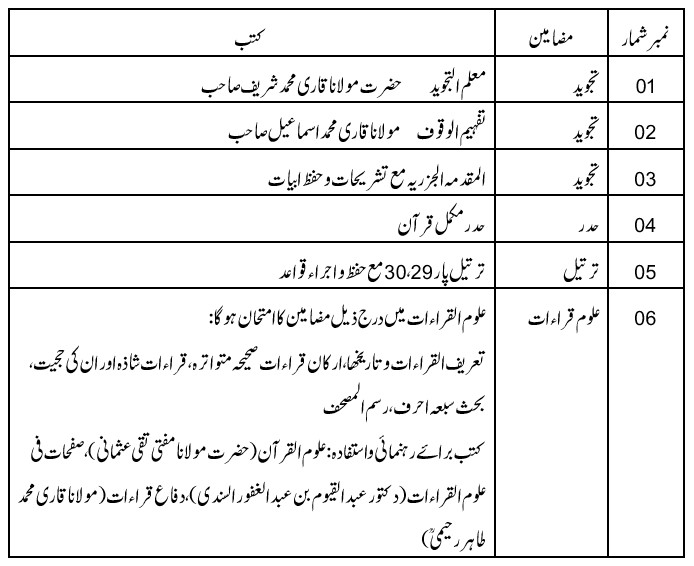Jamia Darul Uloom Naseeria Ghorghushti’s Curriculum of Dars-e-Nizami, comprising contemporary subjects and Islamic sciences, implemented in the Attock district.
The total duration of education at Jamia Darul Uloom Naseeria Ghorghushti is eighteen (18) years, with a brief outline as follows:

Note: Currently, primary and middle-level education is only available for girls. Insha’Allah, education for boys at this level will be initiated soon as well.
The curriculum for this level follows the Punjab Textbook Board; however, some additional content has been included in the Islamiat syllabus. The details are as follows:







This phase spans a duration of three years, and its curriculum also follows the Punjab Textbook Board. However, additional content has been incorporated into the Islamiat syllabus.




Up to this point, the education consisted of contemporary subjects spanning a duration of ten years. Following this, an eight-year curriculum focusing on Arabic and Islamic studies is offered, known as the “Dars-e-Nizami.” This curriculum is divided into four stages, each lasting two years: Aammah, Khaassah, Aaliyah, and Aalimiyyah.
In this two-year stage, the curriculum set by Wifaq Al-Madaris Al-Arabiyya Pakistan for the Dars-e-Nizami is taught. The details are as follows:

Note: In the first year of the general stage, there is also one hour dedicated to teaching calligraphy, where students learn calligraphy. Additionally, there are two hours after Zohar prayer for teaching grammar (Nahw) and morphology (Sarf), where students are instructed in these subjects.






This year is known as the Hadith course, in which primarily the foundational texts of Hadith are taught. The details are as follows:

Note: Jamia Darul Uloom Naseeria Ghorghushti offers a two-year Dirasat-e-Deeniya course for college and university students, traders, professionals, and both men and women seeking religious education. The curriculum for this course is outlined below.



Note:
(A) For the explanation of the Muqaddimah Jazaariyah, students may refer to the following resources:
(B) Admission to the Tajweed examination for scholars requires a Wifaq certificate of Shahadah Al-Alimiyah. Students who fail the Muqaddimah Jazaariyah, Hadr (fast recitation), or Tartil (slow recitation) and memorization examination will be considered unsuccessful. Upon passing the Tajweed examination by the Wifaq Al-Madaris, the Shahadah Al-Tajweed for scholars will be issued.
For Further Study: Defence of Qira’at by Mawlana Qari Muhammad Tahir Rahimi

For admission to the Tajweed examination for Hafiz (memorizers), a Wifaq certificate of Hifz (memorization) is required. Hafiz students will be issued the Shahadah Al-Tajweed (Lihafiz) upon passing the Tajweed examination conducted by the Wifaq Al-Madaris.
Calligraphy, Urdu, Social Studies, Mathematics, Persian Composition, and Arabic Composition are mandatory written exercises. The teachers check the exercise books and provide corrections.
Two assignments are compulsory for students related to each lesson. One is to study the book for the next day’s lesson so that the student’s mind is prepared to understand the lesson with insight and alertness in front of the teacher. The second assignment is to revise the previously studied lesson. “Revision” is a term used in the seminaries, where students sit in small groups during the day or night after studying with the teacher. One of the students repeats the lesson according to the method taught by the teacher. This method is a distinctive feature of Dars-e-Nizami, through which each student not only solidifies the lesson in their mind but also receives practical training in teaching and expressing their thoughts. Revision is mandatory for almost every class of students.
Each class has three examinations during the year: quarterly, semi-annual, and annual. Students who achieve good marks are encouraged through rewards.
Upon completing each level, a certificate is awarded to the student, and a formal certificate is issued upon the completion of the curriculum. In Pakistan, this certificate is now considered equivalent to an MA in Islamic Studies and Arabic in certain fields.
These activities include reading non-curricular books, organizing a session once a week for speech practice, providing cleanliness services for the Jamia, and participating in sports during leisure time only at the sports field of Jamia Darul Uloom Naseeria.